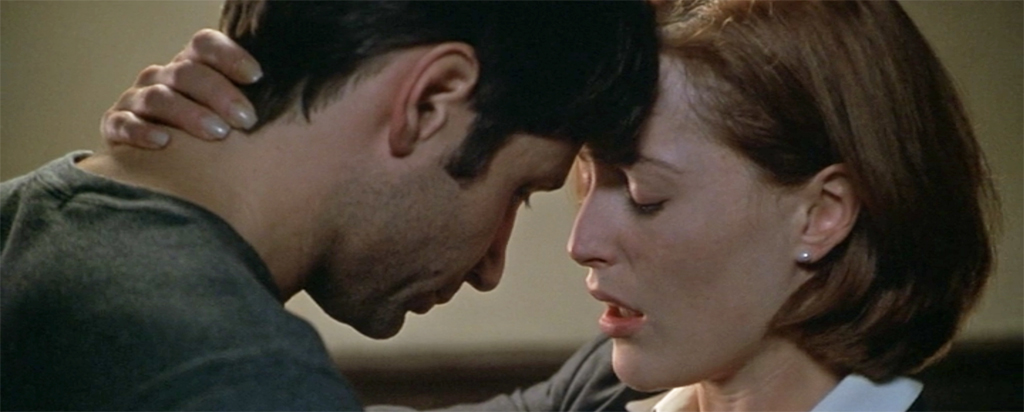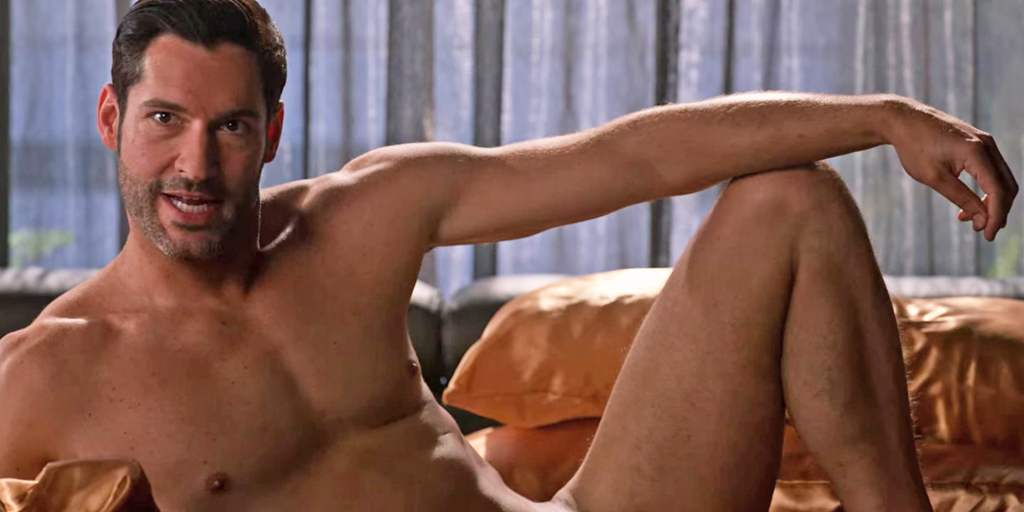Lucifer: The Final Season arrives this week for one final dance with the devil to add up to six seasons of the Neil Gaiman-created leading character, who’s portrayed to gloriously saucy effect by Tom Ellis. Three of those seasons are a testament to Netflix’s ability to successfully resurrect after a network (in this case, FOX) gave up on a fan-favorite property. Mr. Morningstar has progressed down quite a path, too, with one of those stories that started out as a procedural show with a supernatural bent. Then the show grew more character-based, with the stakes growing ever more ridiculous but all the more engrossing. This year, Satan has (absurdly, but does it really matter?) ascended to being God, and there’s the whole apocalypse thing waving around, but most importantly, the show has convinced me that there’s an instance where Unresolved Sexual Tension (UST) can be resolved without ruining a dynamic for viewers.
Yep, I’m talking about UST here. That silly term that dates back to The X-Files, which (I believe, and correct me if I’m wrong) actually put an acronym on it for the fandom. Nowadays, the kids describe the act of rooting for UST to be resolved as “‘shipping,” and people get awfully invested in this stuff, but The X-Files certainly wasn’t the first show in which the concept surfaced. Several decades have built upon the will-they-or-won’t-they aspect of whether good friends (often colleagues who spend an inordinate amount of time together solving mysteries) will finally capitalize upon their chemistry and fall into bed together. Viewers get invested in this type of set-up, which is why we see it happen endlessly, for better or worse. When it comes to long-running series, I’m here to say that, more often than not, I’ve been disappointed in the results of said hookup.

For simplicity’s sake, let’s give a mention to FBI Special Agents Fox Mulder (David Duchovny) and Dana Scully (Gillian Anderson). For eleven seasons (including a so-so revival effort) and two movies, the polar opposites became trusted partners and friends and lovers and ex-lovers and the parents of a child amid multiple instances of alien abduction. Ultimately, I found that the actual pairing wasn’t nearly as heat-filled (and that link refers to an episode that Anderson directed) as their apparently romantic and sexual chemistry (and fan-fiction) would lead one to believe. I mean, it was disappointing to me (and maybe that’s because the show once suggested that Mulder would die of autoerotic asphyxiation, which is… something), but I don’t want to dive too deep on the mechanics of the pairing — although, damn, it seemed mechanical — because ultimately, this is a piece to celebrate the unlikely victory of Lucifer‘s effective resolution of UST.
Still, let’s look at one more case of a TV pairing (a currently running one this time) that’s dancing awfully close to the same flame. This involves Chris Meloni’s return to the Law and Order universe with his Elliot Stabler-focused spinoff, Organized Crime. For a good decade or so, Stabler and Benson put sexual offenders behind bars on SVU before Meloni’s contractual dispute led Stabler to evaporate from NYC and Benson’s orbit. He surfaced a decade later, and Liv’s understandably rattled. They’ve got undeniable chemistry, although they seemed safe from falling prey to temptation because Stabler was happily married and would never cheat. That won’t do for fandom, though, so the show did some service by killing off Stabler’s wife, which is a sad enough development already, but then Stabler’s going off the rails in his quest for vengeance. That eventually led to an intervention by his kids and Olivia, and then he dropped that “I love you” bomb. No one knows if he meant to say that to Liv, and it was left ambiguous, so [big sigh].

This, actually, was a coupling that I mildly rooted for to happen, but now that we’re on the cusp of it all, with Stabler and Olivia finishing up last season on another SVU crossover episode where they’re wistfully staring into the sky together while attending a wedding for Ice-T’s character, I find myself thinking, “Oh please, TV gods, don’t let this happen.” There’s simply been too much buildup, and these two would seriously get on each other’s nerves after a while. Stabler likes the old-fashioned relationship vibe with his wife holding down the fort, and Olivia’s blissfully independent. He might think that he needs her, but she won’t need him for sure, and yeah, this sh*t would be a mess. Don’t do it, Dick Wolf and company.
The problem, quite often, is that the magic of UST is in its unresolved nature. There’s a heat there that threatens to evaporate when the coupling finally happens. Yet Lucifer has changed my mind about how UST can be resolved in a fulfilling way for both characters and audience. And I realize that talking about other shows is an unorthodox way to recommend watching a different show, but UST resolution is a large part of what this Netflix series has to offer to the skeptical.
What I’m saying is this: I was prepared for enjoying Lucifer already on a few fronts: (1) The procedural framing of the show, which has (in the later seasons) taken an increasing backseat, although damn, it’s highly enjoyable to watch the Devil decide to be an LAPD detective because he’s bored with Hell and gets his jollies from solving human crimes; (2) It’s a Neil Gaiman property, which means the characters are drawn in such a way that you can appreciate their most superficial and deepest qualities in equal measure; (3) It’s simply a fun show, and one that makes great use of the most ridiculous fantasy elements imaginable, including warring angel-and-devil wings.
The UST factor, though, is what (surprisingly) make this show the long-game standout. At first, though, I groaned over how both Lucifer and Chloe danced around each other as “co-workers,” before their undeniable physical chemistry evaporated every time because she’d catch him having sexy times with a stewardess or whomever. And boy, did I roll my eyes at Chloe’s origin story, which was that she was created for Lucifer. That pissed her off for a short period of time, and then she somehow didn’t mind it. I wanted more for Chloe and actively cringed as it became inevitable that they’d sleep together.

Yet when they did fall into bed in Season 5 (relatively late in the game, so kudos to the writers for drawing it out that long), the fallout for Lucifer was spectacular and hilarious. Chloe walked away with his “mojo” power, and he was left scrambling without it. And she could even use the mojo against him, which was delightful. There’s nothing more disarming than a sputtering Tom Ellis, after all, and eventually, he got that mojo back, but he appeared to have walked away while learning a lesson, one that has reverberated into this final season: being a pain-in-the-butt is highly overrated. And it’s a waste of energy. There are more important and rewarding endeavors, and that’s part of what the final season is all about.
We see Lucifer transform, and the writers really do the leg work. He’s still a bit of a dick, yes, but he’s somehow a genuinely good “person.” It took six seasons for the show to make that reveal, and he makes grand sacrifices and learns to stop putting himself first in this final season. He does this not only out of love for Chloe but for other, spoiler-y reasons, but chief among them: the resolution of the Unresolved Sexual Tension took Lucifer other (unlikely) places beyond the carnal. The UST was actually a building block to better places, so the show turned out to be a lot less shallow than expected, and that goes for other characters, too. Major props go out to Warner Bros. for being able to wrap up this show with a surprisingly profound ending to what originally began as pure fluff.
At the heart of it all, the UST managed to take the show to unexpected places and far beyond the sexual realms. Instead of fizzling out of energy, like what can happen when two ‘shipped characters finally give in and sleep together, these characters went to more interesting new heights. And that, somehow, extended to supporting characters, too. Lucifer’s messy therapist gains dimension. Eve and Lilith and Amenadiel find purposes beyond their initial supernatural intent, the forensic-team characters find purposes beyond the obvious (Ella Lopez is still great), and somehow, this show gets deep, even addressing the Black Lives Matter movement in a fitting way. The new layers and texture all feel earned, too, rather than tacked on for a final, initially unplanned season that could have simply been fan service and gotten away with it.
Ultimately, lots of credit goes to Netflix for picking up a network-canceled show and giving it three more seasons while making it a series that got better with time, churning out mythology and moving past its initial gimmicks to give us characters worth caring about. And heck, I cried (a tiny bit) at the end. Got all emotional about the Devil and his friends and enemies, and yep, I’ll miss them all. Lucifer turned out to be a much better show than it ever needed to be, and the final season is a downright pleasure to witness.
Netflix’s ‘Lucifer: The Final Season’ streams on September 10.







